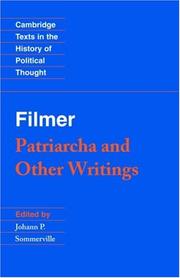| Listing 1 - 3 of 3 |
Sort by
|
Book
ISBN: 382528316X 3205773950 9783205773955 Year: 2005 Publisher: Köln ; Wien ; Weimar Böhlau Verlag
Abstract | Keywords | Export | Availability | Bookmark
 Loading...
Loading...Choose an application
- Reference Manager
- EndNote
- RefWorks (Direct export to RefWorks)
Authoritarianism --- Enlightenment --- Intellectuals --- 321.61 --- 321.61 Absolutisme. Despotisme --- Absolutisme. Despotisme --- Intelligentsia --- Persons --- Social classes --- Specialists --- Aufklärung --- Eighteenth century --- Philosophy, Modern --- Rationalism --- Political science --- Authority --- History --- Europe --- Council of Europe countries --- Eastern Hemisphere --- Eurasia --- Politics and government
Book
ISBN: 2130393446 9782130393443 Year: 1986 Publisher: Paris Presses universitaires de France
Abstract | Keywords | Export | Availability | Bookmark
 Loading...
Loading...Choose an application
- Reference Manager
- EndNote
- RefWorks (Direct export to RefWorks)
Political systems --- World history --- Monarchy --- Monarchie --- 321.727 --- 321.61 --- -#SBIB:324H40 --- #SBIB:94H2 --- 342.3 --- 321.72 --- Kingdom (Monarchy) --- Executive power --- Political science --- Royalists --- Constitutionele monarchie. Democratische regeringsvormen --- Absolutisme. Despotisme --- Congresses --- Politieke structuren: algemeen --- Geschiedenis van Frankrijk --- Congresses. --- 321.61 Absolutisme. Despotisme --- 321.727 Constitutionele monarchie. Democratische regeringsvormen --- #SBIB:324H40 --- Monarchie. Histoire. (Mélanges) --- Monarchie. Geschiedenis. (Versch. onderwerpen) --- Monarchy - Congresses --- Monarchie - Congrès

ISBN: 052137491X 0521399033 1316041417 0511812647 Year: 1990 Publisher: Cambridge : Cambridge University Press,
Abstract | Keywords | Export | Availability | Bookmark
 Loading...
Loading...Choose an application
- Reference Manager
- EndNote
- RefWorks (Direct export to RefWorks)
In seventeenth-century England, patriarchalist thinking shaped English ideas not only about the family but also about society and the state. Many thinkers argued that the state should be seen as a family, and that the king held the powers of a father over his subjects. The classic texts of patriarchal political thinking were written by Sir Robert Filmer (1588-1653), one of the most acute defenders of absolute monarchy. In addition to presenting his own patriarchalist theory, Filmer's works contain incisive attacks on democratic thinking and on the notion that political obligation stems from a contract between ruler and ruled. His political works are here edited from the original manuscript and printed sources, with an introduction which locates Filmer's ideas in their historical and ideological contexts. These texts - to which John Locke replied in his influential Two Treatises of Government - provide highly important documents for the understanding of political and social ideas at a decisive stage in the development of English attitudes.
321.11 --- 321.61 --- Monarchy --- Political science --- -#GROL:SEMI-32<08> Camb --- #GROL:SEMI-32-05.3 --- Administration --- Civil government --- Commonwealth, The --- Government --- Political theory --- Political thought --- Politics --- Science, Political --- Social sciences --- State, The --- Kingdom (Monarchy) --- Executive power --- Royalists --- Patriarchaat --(politieke organisatie) --- Absolutisme. Despotisme --- Early works to 1800 --- #A9105W --- Monarchy. --- 321.61 Absolutisme. Despotisme --- 321.11 Patriarchaat --(politieke organisatie) --- #GROL:SEMI-32<08> Camb --- Social Sciences --- Political Science
| Listing 1 - 3 of 3 |
Sort by
|

 Search
Search Feedback
Feedback About UniCat
About UniCat  Help
Help News
News